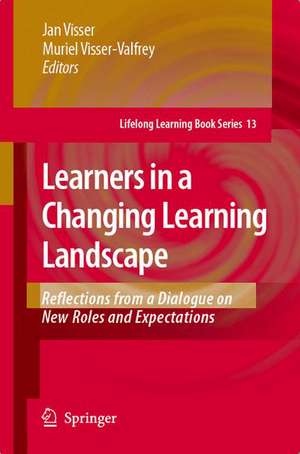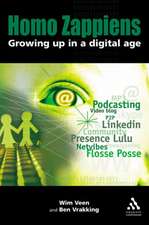Learners in a Changing Learning Landscape: Reflections from a Dialogue on New Roles and Expectations: Lifelong Learning Book Series, cartea 12
Editat de Jan Visser, Muriel Visser-Valfreyen Limba Engleză Hardback – 6 iun 2008
| Toate formatele și edițiile | Preț | Express |
|---|---|---|
| Paperback (1) | 945.47 lei 43-57 zile | |
| SPRINGER NETHERLANDS – 28 oct 2010 | 945.47 lei 43-57 zile | |
| Hardback (1) | 951.47 lei 43-57 zile | |
| SPRINGER NETHERLANDS – 6 iun 2008 | 951.47 lei 43-57 zile |
Din seria Lifelong Learning Book Series
- 18%
 Preț: 775.78 lei
Preț: 775.78 lei - 18%
 Preț: 887.38 lei
Preț: 887.38 lei - 18%
 Preț: 777.20 lei
Preț: 777.20 lei - 15%
 Preț: 642.51 lei
Preț: 642.51 lei - 18%
 Preț: 958.56 lei
Preț: 958.56 lei - 18%
 Preț: 1116.57 lei
Preț: 1116.57 lei - 15%
 Preț: 646.43 lei
Preț: 646.43 lei - 18%
 Preț: 954.77 lei
Preț: 954.77 lei - 20%
 Preț: 559.19 lei
Preț: 559.19 lei - 15%
 Preț: 639.25 lei
Preț: 639.25 lei - 20%
 Preț: 557.45 lei
Preț: 557.45 lei - 15%
 Preț: 640.06 lei
Preț: 640.06 lei - 20%
 Preț: 574.62 lei
Preț: 574.62 lei - 15%
 Preț: 637.28 lei
Preț: 637.28 lei - 20%
 Preț: 573.20 lei
Preț: 573.20 lei -
 Preț: 395.09 lei
Preț: 395.09 lei - 24%
 Preț: 864.86 lei
Preț: 864.86 lei - 18%
 Preț: 1116.57 lei
Preț: 1116.57 lei - 24%
 Preț: 736.31 lei
Preț: 736.31 lei - 20%
 Preț: 574.08 lei
Preț: 574.08 lei -
 Preț: 423.29 lei
Preț: 423.29 lei - 24%
 Preț: 686.14 lei
Preț: 686.14 lei - 15%
 Preț: 641.53 lei
Preț: 641.53 lei - 24%
 Preț: 900.82 lei
Preț: 900.82 lei - 15%
 Preț: 643.34 lei
Preț: 643.34 lei - 18%
 Preț: 958.25 lei
Preț: 958.25 lei - 18%
 Preț: 951.91 lei
Preț: 951.91 lei
Preț: 951.47 lei
Preț vechi: 1160.32 lei
-18% Nou
Puncte Express: 1427
Preț estimativ în valută:
182.07€ • 190.57$ • 151.53£
182.07€ • 190.57$ • 151.53£
Carte tipărită la comandă
Livrare economică 31 martie-14 aprilie
Preluare comenzi: 021 569.72.76
Specificații
ISBN-13: 9781402082986
ISBN-10: 1402082983
Pagini: 316
Ilustrații: XII, 302 p.
Dimensiuni: 155 x 235 x 22 mm
Greutate: 0.62 kg
Ediția:2008
Editura: SPRINGER NETHERLANDS
Colecția Springer
Seria Lifelong Learning Book Series
Locul publicării:Dordrecht, Netherlands
ISBN-10: 1402082983
Pagini: 316
Ilustrații: XII, 302 p.
Dimensiuni: 155 x 235 x 22 mm
Greutate: 0.62 kg
Ediția:2008
Editura: SPRINGER NETHERLANDS
Colecția Springer
Seria Lifelong Learning Book Series
Locul publicării:Dordrecht, Netherlands
Public țintă
ResearchCuprins
Let the Dialogue Begin: An Introduction.- Constructive Interaction with Change: Implications for Learners and the Environment in Which They Learn.- The Learning Sciences, Technology and Designs for Educational Systems: Some Thoughts About Change.- Learners in a Changing Learning Landscape: Reflections from an Instructional Design Perspective.- The Influence of Epistemological Beliefs on Learners' Perceptions of Online Learning: Perspectives on Three Levels.- Getting to Know the Feral Learner.- Postsecondary Education in the Changing Learning and Living Landscapes.- Online Learning in Context.- New Online Learning Technologies: New Online Learner Competencies. Really?.- Reflections on Seeking the ‘Invisible’ Online Learner.- Will Games and Emerging Technologies Influence the Learning Landscape?.- What Makes Good Online Instruction Good?: New Opportunities and Old Barriers.- Why Basic Principles of Instruction Must Be Present in the Learning Landscape, Whatever Form It Takes, for Learning to Be Effective, Efficient and Engaging.- We Question, We Reflect, and We Question Again, Therefore We Are…: An Analysis of the Evolving Dialogue Around the Central Themes in This Book.
Recenzii
From the reviews:
The world is changing, learners are changing, and thus the learning processes must change as well. Will technology answer the challenges of these changes? Is the institution of the school capable of adapting to the changes? These are crucial questions that educators and scholars in the field of learning have no choice but to ask themselves, and there is no better source for reflection on such questions than this book. We all have a lot to learn so we can cope with the changing world, and this book is a very useful tool for that.
Gavriel Salomon (Recipient of the Sylvia Scribner Award by the AERA Div. C, Recipient of the Israeli National Award for lifelong achievements in educational research)
In this book the authors confront and address the challenges of teaching, learning, adaptivity, and collaboration in the 21st century. In a most readable prose, they share the results of their sustained dialogic inquiry about the impact of new technologies. They integrate a wide range of studies and provide an interdisciplinary vision of the future that is both hopeful and informative.
Vera John-Steiner (Author of Notebooks of the Mind and Creative Collaboration)
I can think of few books that so richly analyze the complex transformations that we are now experiencing in the learning and education environment. Learning has become a multi-faceted, interactive and often auto-didactic process, driven by profound changes to the culture of institutions as well as to their purpose. This book allows us to navigate these new and often uncharted terrains with essays that traverse the most basic elements of learning right through to the complex shifts being engendered by digital technologies. A magnificent and valuable book!
Ron Burnett (President of the Emily Carr Institute of Art and Design - author of How Images Think)
Is the technologized world of today and tomorrow a landscape where learners can thrive? The contributors to this probing volume both celebrate and question the future of learning in an unsettling era of digital environments and global interactions.
David Perkins (Senior Professor, Harvard Graduate School of Education - author of Smart Schools and Outsmarting IQ)
"Learners in a Changing Learning Landscape is a snapshot of the state of thinking among participating scholars … . For readers interested in depth over breadth related to the chapter topics, each author also provides chapter summaries and directs the reader to additional resources for further study. Most importantly, the authors individually, and the volume collectively … stimulate further dialog. In this sense, the volume is intended to showcase an international dialog among researchers, theorists and practitioners from around the globe … ." (Michael Hannafin, Educational Technology Research and Development, Vol. 57, 2009)
The world is changing, learners are changing, and thus the learning processes must change as well. Will technology answer the challenges of these changes? Is the institution of the school capable of adapting to the changes? These are crucial questions that educators and scholars in the field of learning have no choice but to ask themselves, and there is no better source for reflection on such questions than this book. We all have a lot to learn so we can cope with the changing world, and this book is a very useful tool for that.
Gavriel Salomon (Recipient of the Sylvia Scribner Award by the AERA Div. C, Recipient of the Israeli National Award for lifelong achievements in educational research)
In this book the authors confront and address the challenges of teaching, learning, adaptivity, and collaboration in the 21st century. In a most readable prose, they share the results of their sustained dialogic inquiry about the impact of new technologies. They integrate a wide range of studies and provide an interdisciplinary vision of the future that is both hopeful and informative.
Vera John-Steiner (Author of Notebooks of the Mind and Creative Collaboration)
I can think of few books that so richly analyze the complex transformations that we are now experiencing in the learning and education environment. Learning has become a multi-faceted, interactive and often auto-didactic process, driven by profound changes to the culture of institutions as well as to their purpose. This book allows us to navigate these new and often uncharted terrains with essays that traverse the most basic elements of learning right through to the complex shifts being engendered by digital technologies. A magnificent and valuable book!
Ron Burnett (President of the Emily Carr Institute of Art and Design - author of How Images Think)
Is the technologized world of today and tomorrow a landscape where learners can thrive? The contributors to this probing volume both celebrate and question the future of learning in an unsettling era of digital environments and global interactions.
David Perkins (Senior Professor, Harvard Graduate School of Education - author of Smart Schools and Outsmarting IQ)
"Learners in a Changing Learning Landscape is a snapshot of the state of thinking among participating scholars … . For readers interested in depth over breadth related to the chapter topics, each author also provides chapter summaries and directs the reader to additional resources for further study. Most importantly, the authors individually, and the volume collectively … stimulate further dialog. In this sense, the volume is intended to showcase an international dialog among researchers, theorists and practitioners from around the globe … ." (Michael Hannafin, Educational Technology Research and Development, Vol. 57, 2009)
Textul de pe ultima copertă
This book is about questions. Today's learners face constant change. Adaptive learner expertise is key to their survival on a learning journey that lasts a lifetime. This requires new thinking of all actors in the learning environment. The fundamental process through which this book was created is an extended in-depth dialogue among researchers, lifelong learners, educators, and thinkers.
"Working on this book was a very special kind of experience," says John Bransford (University of Washington), a contributing author to the book and renowned researcher on how people learn. While participating in the dialogue "we were all helped to ‘walk our talk’ and use technology to improve everything we did… I'm convinced that the conversations will not end with this book. Through technology-based dialogue facilitated by the magic touch of the editors’ leadership, I'm sure that all of us—authors and readers of this volume—will continue to learn from one another. This is the way that collaborative science should work."
"Working on this book was a very special kind of experience," says John Bransford (University of Washington), a contributing author to the book and renowned researcher on how people learn. While participating in the dialogue "we were all helped to ‘walk our talk’ and use technology to improve everything we did… I'm convinced that the conversations will not end with this book. Through technology-based dialogue facilitated by the magic touch of the editors’ leadership, I'm sure that all of us—authors and readers of this volume—will continue to learn from one another. This is the way that collaborative science should work."
Caracteristici
Provides innovative insights into the nature of human learning from multiple perspectives and in diverse contexts Is as much a book to inform innovative research and practice as a textbook for advanced courses Includes exercises and recommended resources for further exploration Has been uniquely conceived to be the result of in-depth dialogue within the author team and is intended to foster continued dialogue among its users Brings together the experiences and views of both learners and teachers Critically discusses the interaction between learners, learning, the environment, and technology use and examines implications for the future of learning





